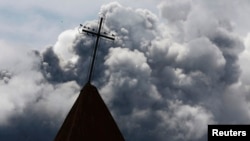Authorities on Indonesia's Sumatra Island have sealed three churches that officials said lacked necessary permits.
The Communion of Churches in Indonesia (PGI) is dispatching a legal team to assist the churches that were closed September 27. PGI General Secretary Gomar Gultom told VOA's Indonesian Service on Friday that the legal team will take a cultural approach "rather than a legal approach" which takes a long time. "The legal process is our last resort," he added.
The move by officials in the West Kenali village of the Alam Barajo district of Jambi province is the latest push to close churches in a move that followed more than 1,000 closures in more than a decade.
Until then, Indonesia had a reputation for an interpretation of Islam that embraced religious tolerance. But Muslim extremists have been urging the adoption of Islamic law throughout Indonesia, creating religious divides.
A civil court found the Christian governor of the capital, Jakarta, guilty of blasphemy in May 2017. However, in predominantly Christian Papua, the Protestant Communion of Churches in Jayapura wanted a mosque's minaret torn down because it was taller than church steeples in the area.
In Jambi, the city's Civil Service Police (Satpol PP) sealed the three churches — Indonesia Christian Huria HKI (Huria Kristen Indonesia), Indonesian Methodist Church GMI (Gereja Methodist Indonesia) and God's Assemblies Church GSJA (Gereja Sidang Jemaat Allah) — on Thursday morning. According to numerous posts on Facebook, the authorities cited violation of public order and building permit ordinances. Dozens of congregants wept as the churches were closed.
Most worrisome to PGI is that the churches were closed for administrative reasons because religious freedom is guaranteed by Indonesia's constitution. "The local government keeps delaying the process to have the permit, or just reject it without any reasons," said Gultom.
"There are thousands of other places of worship that don't have permits, but continue to operate," he said. "I just can't understand why they won't let us have our churches. I can understand if [the local government] prohibited us from having the permits if we used the buildings for criminal activities, but we used them to praise God."
The head of the National and Political Unity Agency (Kesbangpol) of Jambi, Liphan Pasaribu, told local media that the church closures were the result of a joint decision made Wednesday by several government agencies and the police, as well as the local chapters of Indonesia's top Muslim clerical body, the Ulema Council (MUI), and the Religious Harmony Forum (FKUB).
Jambi District Spokesman Abu Bakar told VOA that the church closures were "just a temporary action due to objections" from the local community upset by the violation of "administrative issues. The Religious Harmony Forum decided to close the churches to avoid unnecessary incidents. We think it's a wise decision to cool down the situation."
He denied that the Islamic Defense Front (FPI), a far-right Islamist group, had urged local authorities to close the churches, and added that if the churches file the necessary documents, permits will be issued within a week.
Aan Anshori, coordinator of the Islamic Anti-Discrimination Network (JIAD) which is an NGO affiliated with Nadhlatul Ulama, Indonesia's largest independent Islamic organization, said that "Islamic teaching seems to fail to understand that other religions, especially Christianity, need to be respected in a democratic country like Indonesia. But there's a strong impression that other religions are considered enemies of Islam. It shows that there is something wrong in Islamic teaching and also in understanding the rights of all citizens, no matter what their religion."
Eva Mazrieva in Washington, D.C., contributed to this report, which originated in VOA's Indonesian Service.




